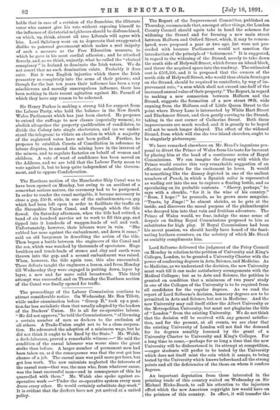The proceedings of the Labour Commission continue to attract considerable
notice. On Wednesday, Mr. Ben Tillett, while under examination before " Group B," took up a posi- tion far less socialistic than that usually adopted by the leaders of the Dockers' Union. He is all for co-operative labour. " He did not approve," he told the Commissioners, " of licensing a certain number of men as dockers to the exclusion of all others. A Trade-Union ought not to be a close corpora- tion. He advocated the adoption of a minimum wage, but he did not think it ought to be fixed by the State." Mr. Walsh, a dock-labourer, proved a remarkable witness :—" He said the condition of the casual labourer was worse since the great strike than before. A larger number of permanent men had been taken on, and the consequence was that the rest got less chance of a job. The casual man was paid more per hour, but got less work. The new unionists neglected the interests of the casual man—that was, the man who, from whatever cause, was the least successful man—and in consequence of this he quarrelled with them." Mr. Walsh also spoke against co- operative work :—" Under the co-operative system every man drove every other. He would certainly substitute day-work." It is evident that the dockers have not yet arrived at a united rlig•


















































 Previous page
Previous page